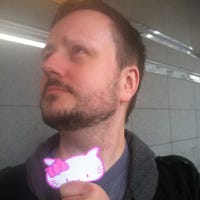
Featured Blog | This community-written post highlights the best of what the game industry has to offer. Read more like it on the Game Developer Blogs.
At the GDC
Being a few encounters at the 2013 GDC. Cross-posted at neilsclark.com

“This GDC is really weird,” says Jesse.
“Why?” Asks Soraya.
“Because every year everyone seems to know what's happening. Like, maybe one year it's the PS3. Or another year it's motion controls. This GDC, nobody knows what the fuck is going on.”
Adam Sessler is chatting animatedly with a group of random developers, outside the Hotel St. Regis. He's wearing a very stylish hat. I idly wonder what he's been up to, since G4 got bought out. Another part of our group is having a very serious conversation, maybe on business development, while we wait to hit the food courts hidden under the Westfield Mall-thing. Jesse is teaching Soraya a game that he, a former Disney Imagineer, developed while he and his daughter had been waiting in long lines. I mention that their faces look a lot like people playing Johann Sebastian Joust. Jesse looks over, with a very suspect grin.
“Oh man! Have you played Wushu Turtle?”
“Err, no?” I say.
He reaches into a pocket. “Guess who has turtles?”
–
I fucking love the Indie Games Festival.
Dys4ia. Year Walk. Thrity Flights of Loving. FTL. Terry Cavanaugh. Brendon Chung. A dozen badass people I've never met, all of them just sitting around, showing off magic.
I fucking love it.
Walking away from that part of the show floor, I just randomly saw the very last game developer for which I could anticipate nerding out. Raph Koster was wearing an old, grey hoodie and dad jeans.
“Hi Raph Koster,” I say. “You are amazing.”
“Well thanks!” He says, “Who are you?”
The name on my badge has been blocked by a highlighter-colored Hello Kitty.
“Right,” I say, handing him a Hello Kitty business card. “You linked a thesis I once wrote. That was way cool.”
He's peering at the back of the business card. “Oh right. I'd have known that, if I had just been able to see your name.”
And then we proceed to talk about durians, for a moment, before we go our separate ways. I never mention that Star Wars Galaxies – a game for which Raph was the creative lead – taught me how to take chances. That it showed me, first-hand, that I could strive to do big things.
–
“Could you please lower your voices?” Croaks the hunched, white-haired lady behind us.
I'm pretty sure I'm the only one who hears her, but am loving this conversation about “fun” and “engagement” too much to stop either of the two tired men. James wants more than fun. He was just given a 20-year-old roleplay guidebook for holocaust internment camps. Nick wants better fun. He just came from an IGF awards ceremony that glossed over beautiful, innovative designs. Over the past ten minutes, their volume grew to block out near every other sound in the crowded Westfield food court.
“Gameplay can be boring, and still be meaningful.” Says James. “It can be hard, or tedious. Wrapping tedium in gameplay sends a message. Right?”
“No. Boring gameplay is just bad gameplay. We're past that. Other mediums know how to make tedium fun. It's why I keep coming back to Fight Club. Fifteen seconds and we know Tyler Durden's job is boring. Fifteen fucking seconds and we still give the gameplay award to Cart Life. Profound respect to that game, right. Did it deserve to win narrative? Yes. Did it have beautiful art? Yes. But gameplay? I mean--”
“EXCUSE ME... SIR.” Says the old lady, for the fifth time. “Lower your tone!”
Nick turns around, and puts a hand over his chest. “Oh my gosh, I am so, so sorry.”
James says, “We need to do this more often. I love it when we violently agree.”
“Absolutely.”
“Wow. I don't get it.” Says a younger game designer. “Why get so worked up if you both agree?”
“Because these kinds of tiny distinctions will fundamentally alter how this medium develops.”
–
“Is he good people?” Asks the Conference Associate honcho. He gives me the Buddy Christ double-thumbs-up, paired with a questioning look.
I return the pose.
He grins, “Good enough for me.”
And so I chat with a few random CAs before we move to Johann Sebastian Joust. The conference has wound down for the day, and here's a group of about 200 men and women in red shirts. A few of them pass along the Joust batons, and face off. Between the smiles and the game faces, you can tell they've each seen hundreds of game worlds. Some have even made a few. For a week, here in San Francisco, they get to be around old friends. There's a weeklong League of Legends CA tourney. There's a dragon's hoarde of board games. They're masters of Witch Hunter / Vampire Hunter / Mafia.
They are, for a week, family.
At a lunch, later in the week, I met Lincoln the CA. He could be in his late 40's, with a shaved head and a graying handlebar moustache. He lives just down the street from the Moscone Center, where he's volunteered as a CA for twelve years. It'd be thirteen, if not for a year where he was sick (though he still got out to say hi to a few people). A love of D&D brought him to his first GDC. He'd quit a bank job for a chance to work around games. He teased me for the Hello Kitty over my nametag.
“Clearly you've never been a CA.”
“Hey, you guys can scan over the top of it. You have the technology. I did move it once, though, to make that easier for a CA.”
“You could, you know, move it again.”
His wry grin is infectious. But he allowed me to simply grin back, and keep the Hello Kitty positioned just the way I liked it. I really hope I see him again next year.
–
Data doesn't lie. Especially not the data from EEDAR.
In 2012, the top 50 games in North America spent 350m in marketing, and that marketing war is expanding.
53% of gaming magazine covers are for shooters.
WoW makes 500m a year in subscriptions. WoT makes 350m a year in profit. CoD made a 1.6b.
Good games with good marketing make around seven times as much as the good games with bad marketing (emphasis on the around - I'm grossly paraphrasing a beautifully arranged dataset).
To the Moon moved a couple hundred thousand copies.
Limbo did okay. Minecraft made money. Dear Esther moved me. Botanicula made me cry. Flotilla and Star Wars Galaxies spoke to me on profound levels.
I've never played a Call of Duty game for more than a couple hours. If I've even played one; I get it confused with all the other big budget games trying desperately to look exactly like it and tackle its market share.
–
It's been a long time since the title “gamer” held any meaningful association in my mind. When the industry was small, maybe. But for years now, calling yourself a gamer has been tantamount to calling yourself a TV watcher. There are differences between Sponge Bob, Fox News, Survivor, and the surgery channel. With tens of thousands of new games coming out yearly, and 60% of the USA playing games “to pass the time,” the distinctions matter.
The people making games are still a community. I left this GDC thinking of them as an extended family.
But I still haven't figured out where I fit. Riding shotgun back to San Jose, in the dark, I'm a little disappointed by that. After all the truly strange, nearly mystical happenings, my place in the gaming cosmos hadn't revealed itself in any blinding burst of light.
So I mention that outloud.
“What is it you want?” Asks another writer. “Money? Power? I mean, be honest with yourself.”
“Yeah,” I say. “I really don't know. Somehow I thought it'd just, be clear.”
I ask the driver, who reasonably says that he doesn't really know me. But he eventually adds, “Think of your life as a wheel with nine spokes. They could be anything. Money, love, anything. But think about how big each spoke is right now, and decide where you want them to be in five years time.”
I write that down, while we try to decide whether it's the Caterpillar or the Cheshire Cat that asks Alice which direction she'll go.
The first writer says, “In five years, what sort of effect do you want to have?”
So I tell him. And it's personal. And when I'm done, I realize that I'm crying. Something I haven't really done since finishing a very neat indie game. I don't think anyone in the car notices.
Later, I go to draw out the spokes of my life, and I realize something. Maybe that the whole exercise is a paradox. Wheels need balanced spokes, if they're going to roll. There's something that I want, in five years. Something that I'd sacrifice for. But if I'm going to get there, nine other spokes need to exist. They need to be in place, but they need to be strong enough not to shred at the first rock in the road.
The games industry has a lot of component parts, each represented by people. New wheels and new spokes and new technologies will surely come. But maybe – just maybe – now's one of those times where we balance what we have. Maybe it's time to use the wheel to get somewhere.
Read more about:
Featured BlogsAbout the Author(s)
You May Also Like









